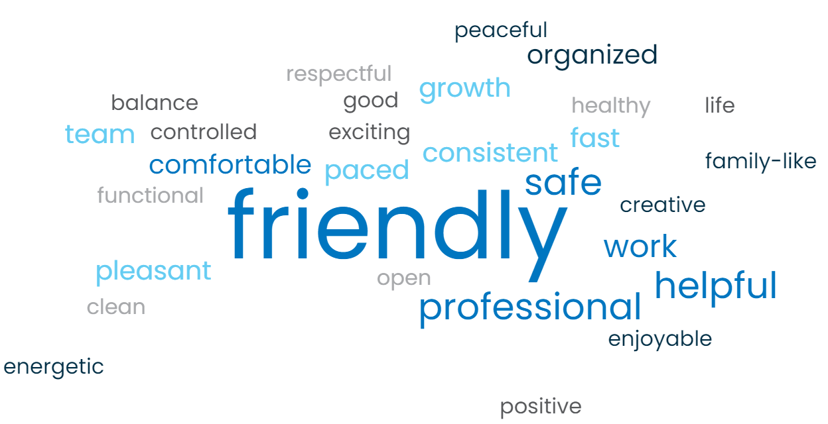This summer, Skills for Chicagoland’s Future (Skills) conducted a survey of over 200 individuals comprised of a mix of recent placements and active job seekers. The purpose of the survey was to gather a better understanding of 1) what individuals are prioritizing in their job searches and 2) why individuals are leaving their jobs. This report will examine their responses compared to current industry trends and local labor market challenges.
It’s no secret that the job market has seen significant fluctuations over the past two years. As we enter into the post-pandemic era, we’re seeing an increase in job openings but employment rates are slowing down. The most recent Job Openings and Labor Turnover showed 10.3 million total job openings, while the most recent Employment Situation showed an addition of 263,000 jobs in November, compared to the monthly average of 392,000 in 2022. With so many job openings available, understanding what job seekers are looking for in a role can help employers stand out.
What are Job Seekers Looking For in a Quality Job?
The findings from our survey found that the majority of respondents rank compensation/pay as a top priority while looking for a job, with 37% of respondents ranking it as the #1 priority. Respondents ranked having a 401(k) retirement plan as a close second, only 0.3 points behind compensation/pay. The bottom of the list included vision insurance, parental leave, and tuition reimbursement, with each only receiving 1% of the top priority vote.
Why are People Leaving their Jobs?
That’s a big question on employers’ minds today. We found that 48% of respondents had not worked in their job for more than 12 months. While this could be partially accounted for because some respondents were recently placed into a job by Skills, of the 48% of respondents who did not continue working at their job in the past 12 months, 10% were let go and 38% made the decision to leave on their own. The top reasons the respondents chose to leave are listed below. Let's dig deeper into why personal reasons and opportunities for career development landed where they did on the list.
Personal Reasons
While the pandemic caused an unquestionable ripple in the job market, it allowed many people the time to evaluate their goals and priorities when it comes to work. We found that the number one reason respondents indicated leaving their job within the past 12 months was for personal reasons (19%).
This top reason is trending across the globe, too. According to a global McKinsey & Company Survey conducted this past summer, 2 out of five – or 40% – workers across the globe said they are thinking about leaving their job within the next three to six months. The biggest reason being personal, including moving to a different industry, seeking nontraditional work such as starting their own business, or responding to the demands of life (caring for themselves, their children, or elderly family members).
Opportunities for Career Development
Respondents listed having better career advancement opportunities as one of the top reasons they left their job, with higher/equal compensation being second. Job seekers and employees are emphasizing the value of their work, and are looking for opportunities where they can grow their careers with the support of employers that put resources into trainings and career advancement conversations.
What Would Have Gotten You to Stay at Your Previous Job?
These findings can be seen across the world, too. According to the McKinsey & Company global survey, the number one reason workers left their job last year was due to the lack of career development or advancement opportunities available.
What Matters in the Workplace?
The environment in which people work is a substantial factor for employees. When asked in our survey to describe what they were looking for in a workplace environment, overwhelmingly the top answers from respondents focused on a friendly workplace environment.

What Keeps You From Applying To Certain Jobs?
Requirements in the Job Description
Nearly half of our survey respondents reported having difficulty finding work solely based on not meeting all of the minimum requirements for the job. Specifically, respondents with over five years of experience indicated they were facing more challenges meeting job requirements than those with less than five years experience. Why are those with more experience having a more challenging time finding work? A survey conducted by Indeed shows that job seekers feel they need to meet an average of 70% of qualifications in order to apply for a job, but this percentage varies by age. Gen-Zers believe they need to meet only 63% of the qualifications to be considered, while millennials put the number at 68%, Gen-Xers at 76%, and baby boomers at 77%. This shows that younger workers are more likely to apply to jobs they feel they are less qualified for, while their older peers might hold back and miss out.
Lack of Transportation Options
Transportation was rated one of the highest priorities our respondents are looking for in a job with the commute being one of the top reasons indicated for leaving a job. And in a separate survey of our hiring partners, we found that transportation was the least offered benefit for both full-time (16%) and part-time (13%) roles.
Today, the bulk of jobs in Chicago are located in the Loop area or North Side neighborhoods, according to the Great Cities Institute. In 2018, approximately 700,000 jobs were located within a 30-minute train or bus ride from the Loop and North Side, while just 50,000 jobs were located within a 30-minute commute on public transit from the South Side. This lack of opportunities means that job seekers on Chicago’s south and west sides usually have to travel much further to find more opportunities.
Conclusion
We found that our survey's data closely matches with current hiring trends across the globe. First, individuals are prioritizing compensation/pay, retirement benefits, and medical insurance in their job searches. How employers are describing the job and the numerous benefits of working at a company are swaying candidates to apply or pass on applying. Second, individuals are leaving their jobs because of personal reasons related to the current socio-economic climate and a lack of career development opportunities. Additionally, factors such as workplace environment and location/transportation proximity are driving or hindering employee retention.
At Skills, we see the shift that can take place when employers are willing to reevaluate role requirements or focus less on educational requirements and more on skills-based hiring. Our case studies prove that by removing barriers to employment, companies tap into overlooked pools of talent, increase diversity on their teams, and reduce overall hiring inequalities.
To learn more about these survey results, other labor insights, or how Skills can support your hiring goals, contact us today.



